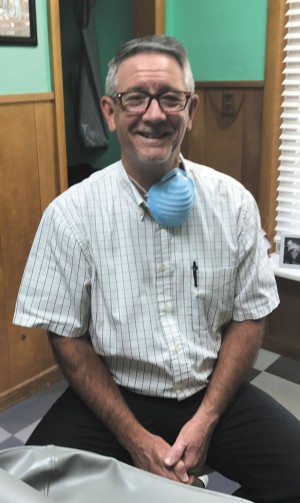While Dr. Daniel Maddigan’s drill went, “Brrrrr, brrrrr . . .brrrrr . . . whine, whine, whine . . . ,” I thought about how skillful a dentist must be. When he paused I asked, “Doctor, were you scared the first time you filled a patient’s cavity?” “Oh yes.”
After he was finished, “I said, “I have several questions. Would you grant an interview?” It strikes me that people know a lot about MD’s, doctors of medicine, but relatively little about doctors of dentistry even though they perform a form of surgery every day. I take extremely seriously what my dentist does, and I rely on his hands to be steady when he has that drill in my mouth!
The operative word is “doctor.” Being a DDS, doctor of dentistry, requires as much education as that of an MD. Dr. Maddigan described the process: “First comes a four-year college degree with a major in a science. Next comes four years of dental school that includes an internship in a dental clinic where you start with things like X-rays. For drill work, they start you out on plastic teeth.” (That makes excellent sense to me!) “You learn by doing.”
I know people who literally let their teeth rot rather than go to a dentist, and they end up with false teeth. If they wait too long, the bone deteriorates, and the dentures aren’t comfortable. Perhaps they associate dental work with pain. However, my dentists never really hurt me. Dr. Maddigan applies a numbing agent before using the hypodermic.
He said, “One patient says that she’d rather go through labor than go to the dentist!” He laughed when I said, “Frankly, Doctor, I don’t come here for fun, but it sure beats labor any day!” I think that perhaps I don’t like being controlled and being confined to the chair even though it’s so much more comfortable these days. Also, I anticipate pain even though I know it isn’t going to hurt. How silly!
Some people learn to dislike going to the dentist when they are children. One dentist put his hand over Vicki’s mouth. Dr. Maddigan says that a child’s first visit should be at age three. “We take it easy so that they don’t become afraid. Sometimes about all we do is to raise and lower the chair several times to get them comfortable with us.”
“What are the biggest changes you’ve seen?” “The discovery that fluoride helps teeth, better materials and digital x-rays that provide better images. These days we wear masks, gloves and protective glasses so that we don’t catch something.
“Are implants is as fast and easy as they appear in TV ads?” “Implants are great, but it’s not that simple. For example implants won’t work if the patient doesn’t have enough bone remaining. An oral surgeon starts the implant in the bone. Then the crown (the tooth) is screwed onto a second piece. It takes some weeks to heal.”
Dr. Maddigan says that most people shouldn’t lose their teeth. Brushing and flossing are crucial to fight the bacteria that cause decay. For mouth wash, he recommends a Listerine-type wash. He added that most people brush their teeth for only fifteen seconds. I love my electronic brush that signals when you brushed enough. My beloved Vivian Forst is 106 years old and still has all of her teeth. She said, “When I was young I worked for a dentist who showed me the correct way to brush — up and down, rather than side-to-side.”
I asked him how teeth affect general health. Missing teeth can cause food not to be properly digested, you can get bacterial gum disease and low-grade infections. Bacteria can enter the bloodstream and damage heart valves. (Sweets and certain soft drinks are major culprits.)
I think about George Washington whose ill-fitting dentures were made of wood. Modern dentistry has taken quantum leaps since then, but it can’t succeed if we don’t care of our teeth. Folks, get out that toothbrush and dental floss and make an appointment for teeth cleaning! wclarke@comcast.net



